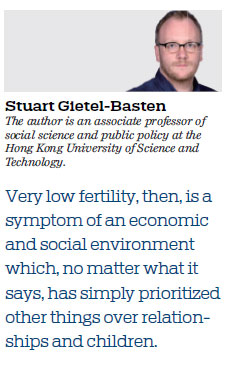Why a baby bonus won't work in an aging HK
Updated: 2019-01-25 06:02
(HK Edition)
|
|||||||||
Hong Kong, in common with many places in Pacific Asia, is aging very rapidly. As we know, rapid aging is caused by a sharp decline in fertility rates. Hong Kong has one of the lowest in the world. So, in this context, encouraging people to have more babies seems like the obvious answer.
A commentator in this newspaper (Page 10, Jan 21) recently advocated the introduction of a HK$250,000 ($32,000) baby bonus to support new parents. Let's consider this from a number of different perspectives. In places where such baby bonuses exist, their success - at least as measured by increasing fertility rates - is questionable. Consider Singapore, for example. The city-state has arguably the most generous set of allowances and bonuses for parents in the world. It has been estimated that a middle-class couple with two children may receive well over $100,000 in government incentives. However, its total fertility rate is even lower than that in Hong Kong!

This leads us to consider why they don't work. Raising children is expensive, of course. And having some extra money would help. But, as the Hong Kong Bauhinia Foundation Research Centre noted in 2014, the cost of raising a child from birth to college graduation in Hong Kong averages about HK$5.5 million for a middle-class family. But, of course, going beyond the direct costs of childbearing, we see an even stronger disincentive. The "motherhood penalty" in Hong Kong, in common with Singapore and elsewhere, is extremely high. The impact of childbearing upon careers, earnings, even dignity is such that the prospect of marrying and starting a family is often unappetizing. In a self-perpetuating culture of family-unfriendliness at work, coupled with challenging prospects for new graduates to find work and an atmosphere where anyone is replaceable, childbearing is a very risky prospect. The idea of respect for family is pervasive, but "when the chips are down", the personal sacrifices associated with childbearing are simply not respected, recognized or rewarded by either the government or employers.
We know that both men and women in Hong Kong want to have more children than they end up with. It is clear, then, that this gap between ideal and actual fertility is the result of social institutions not functioning properly to allow people to live out their aspirations. Rather than being a "problem" to fix (through the means of baby bonuses and the like), very low fertility, then, is a symptom of an economic and social environment which, no matter what it says, has simply prioritized other things over relationships and children. Until we address these malfunctioning institutions head on, it is hard to see how fertility rates in Hong Kong - and elsewhere in the region - will change.
A second problem with solving the aging issue through more babies is that babies don't take up jobs. In fact, not only do they have to wait at least a good 21 years to start working and paying taxes, children divert resources from the working-age population. Apart from the costs of schools, clinics, and other public services for children, time is a critical commodity. At precisely the time when we want to increase female labor force participation, without a major change in working culture and attitudes toward families, a baby boom would simply increase the "motherhood brain drain". Furthermore, unstable cohorts of more births one year followed by fewer the next (as a result of inconsistent policies, for example) can have a detrimental effect on the planning and availability of public services.
Of course, migration is often held up as a means of fixing some problems related to population aging. It is particularly effective in meeting short-term skill shortages. The current state of the care industry in Hong Kong is such that a growing reliance on overseas care workers is inevitable. However, again, it is striking that the proposal in this paper only advocates for a baby bonus for "locals". Why is the child of a mainland Chinese, Nepali or even gweilo less valuable as a contributor to offsetting the burden of aging than that of a "true native" however defined? If the genuine concern was about a demographic solution to aging, then why this specification about locals?
This then allows us to think about some numbers. There were about 61,000 births in Hong Kong last year. Allocating a HK$250,000 baby bonus would result in a bill to the taxpayer around HK$15 billion per year. Just reserving this for local births would make it somewhat smaller, but still a huge amount of money. It seems odd to advocate spending this much money on cajoling women to have babies who are not likely to join the labor force for at least 20 years (by which time, of course, mechanization will have made many more jobs redundant anyway). On the other hand, if I advocated spending HK$15 billion to, say, provide decent public childcare from an early age; or to support small- and medium-sized enterprises to allow women to take proper maternity leave; or to invest in retraining for the older workforce; or to support active aging initiatives to reduce the burden of ill-health in older age I am sure I would be dismissed out of hand as a socialist.
Women in Hong Kong are unfairly penalized for having children. To blame them for the rapidly aging of our population is, quite frankly, a bit rich. To implore them to crack on with having children to solve society's problems - problems created by an older generation of men - seems to be adding insult to injury. By further stating that it should only be the "right" kind of women who should be called upon to fulfil this duty: That is simply going beyond the pale.
(HK Edition 01/25/2019 page12)